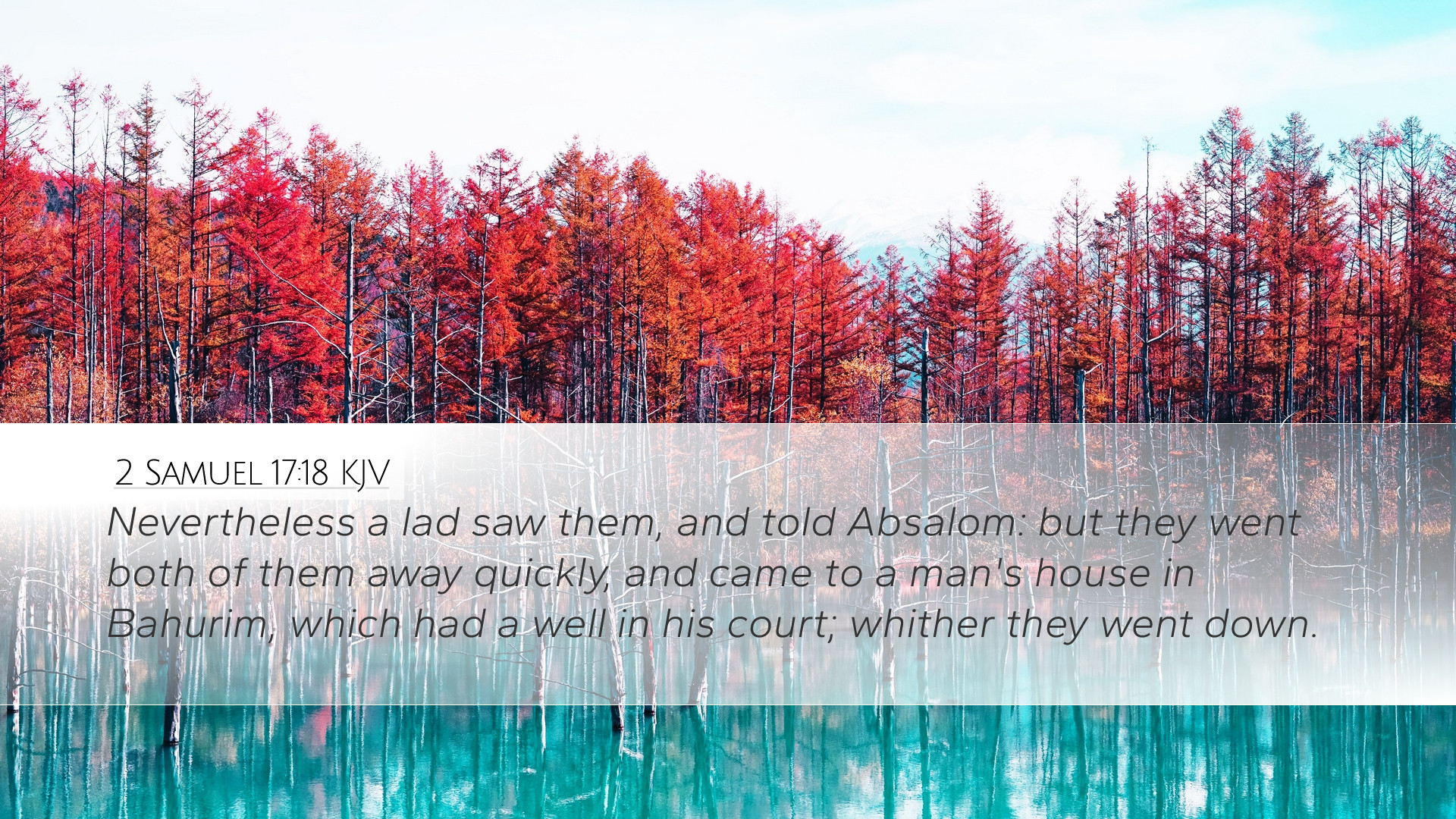Commentary on 2 Samuel 17:18
Verse: "But a lad saw them, and told Absalom: but they went both of them away quickly, and came to a man's house in Bahurim, which had a well in his court; and they went down into the well."
Introduction
This verse falls within the broader narrative of Absalom’s rebellion against his father, King David. It highlights themes of loyalty, providence, and the providential escape of David's loyalists amidst treachery. The incident speaks volumes about the integrity of the faithful individuals who risked their lives for a just cause.
Contextual Analysis
2 Samuel 17 recounts the strategies employed during Absalom’s revolt. After consulting with Ahithophel, Absalom sought to pursue David, leading to actions that reflect both desperation and cunning. The context of this verse demonstrates the extent of conflict among Israel’s leadership and the lengths to which loyal supporters must go to preserve their beliefs and protect the anointed King David.
Insights from Notable Commentaries
Matthew Henry
Henry emphasizes the importance of divine providence throughout this episode. He notes how God often maneuvers allies and enemies in ways that fulfill His purpose. The "lad" who saw the two men likely represents the vulnerability of human actions to divine oversight. Additionally, the swift action of the two men in identifying a place of refuge deeper illustrates the urgency of their situation as they evade capture.
Adam Clarke
Clarke elaborates on the geographical significance of Bahurim, noting that it was a location important to David, and possibly a place of refuge for those loyal to him. He comments on the well as a metaphor for hiding one's faithful actions from the public eye, suggesting that even in dire straits, God provides protection and sanctuary. Clarke also highlights the cultural significance of sharing one's home for refuge, which demonstrates a deep commitment to covenant relationships within the nation of Israel.
Albert Barnes
Barnes focuses on the practical implications of the escape. He notes that the incident illustrates the timely assistance provided to David’s emissaries, which may reflect a deeper faith within the populace. This act of hiding within a well signifies the lengths to which David’s supporters must go to remain faithful amidst overwhelming pressure. Barnes also mentions the implications of loyalty during turbulent political times, drawing parallels to the trials faced by faithful individuals of his own time.
Thematic Exploration
Divine Providence
The actions in this verse serve as a testament to God’s overarching authority over human affairs. The lad’s betrayal of information highlights how God employs unlikely agents to accomplish His will. The quick descent into the well symbolizes the immediate recognition of divine provision and guidance in perilous situations.
Loyalty and Courage
The two men in this verse exemplify the virtues of loyalty and courage. Their willingness to put their lives on the line to protect David is praiseworthy. These characteristics serve as a model for leaders and believers today, emphasizing the necessity of standing firm in one's convictions, regardless of prevailing circumstances.
Symbolism of the Well
The well is symbolic not only of physical refuge but also of the spiritual sustenance available in times of distress. It reflects the idea that in hardships, believers can find solace in their faith and community. This symbolizes the hidden ways through which God preserves and nurtures His people amidst trials.
Application for Today
This verse and its commentary provide essential lessons for modern believers, pastors, and theologians. They underscore the need for vigilance and strategic thinking in facing opposition and encourage reliance on God's providence.
- Endurance in Trials: Just as the men sought refuge, believers are called to seek spiritual and communal refuge amid contemporary struggles.
- The Role of Allies: Maintaining relationships with those who share similar convictions is crucial for support during difficult times.
- Trusting God's Timing: Recognizing that God can use any situation, even betrayals, to lead to escape and victory is vital.
- Impact of Actions: Every action taken, whether seen or unseen, has implications on God’s larger plan, reminding believers of their role in the divine narrative.
Conclusion
2 Samuel 17:18 presents a vivid picture of loyalty and divine providence against the backdrop of political turmoil. By reflecting on the insights from Henry, Clarke, and Barnes, contemporary readers can draw deeper spiritual truths and practical applications. As believers navigate their paths, the principles evident in this verse can guide them towards steadfast faith, courageous action, and the assurance of God’s protective hand.


